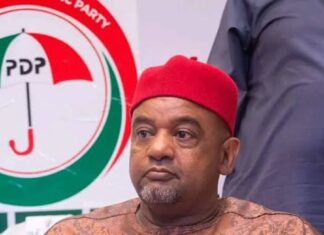By Ejike Anyaduba
It has been weeks of frenzied activities since the government of Anambra State disavowed responsibility for alleged N75 billion bequest of the previous administration.
The media (print and online) was stirred considerably and literally brought home to Anambra.
Headlines were cast as there were interests. Anchors on TV furthered the histrionics by hosting rebutters of unequal strength to dispute the contentious claim.
The disparity in the performance of the two guests on TV (Willie Nwokoye, Governor Willie Obiano’s principal secretary, and Valentine Obienyem (former Governor Peter Obi’s media aide), was tellingly stark.
Expectedly, the disavowal elicited reactions from the people – those who insist there was no N75 billion and others who disagree. There are also those who hedge the bets. Doubters of the government’s position questioned the delay in denying the claim.
They argue that the handover document was delivered publicly in the presence of bank managers and investment consultants during the transition.
But those sympathetic to the government disagreed, waving aside the purported legacy as a fraud. They insist that only a state which spurns development can afford that kind of savings.
In fact, a presenter with Enugu Dream FM while reviewing the morning newspapers that day said if ever there was N75 billion, which is doubtful, it means the ex-governor spent eight years in office doing nothing.
Those opposed to government position seem determined to present the disclosure as rash. That it just woke up to the decision. But how correct are they? Subsequent revelations will show the disclosure as not just thoughtful, but necessary.
Quite early in the life of the administration, a group by the name Anambra State Concerned Professionals had raised an alarm over the questionable legacy in a paid advertorial, The Nation of Tuesday April 1, 2014 refer.
They had warned government against doubts which delayed refutation of the phantom bequest would precipitate.
Though not scorning the advice, government didn’t see the need to wash its dirty linen in public. It wanted to engage the matter more constructively such that it wouldn’t send wrong signals to both contractors and investors.
Note that a good number of these contractors and investors had earlier closed shop because of insecurity and were only returning to the state with the new order.
But more than that, cyber stalkers – at the instance of disgruntled politicians – were desperately trying to make the government of no reputation by dismissing every of its achievements as effort of the spurious legacy.
Perhaps, the burden of doubt would have been lighter had the warning by the concerned professionals signed by one OB Manaka been heeded earlier.
Part of the warning bears repeating here: “The truth is that Peter Obi’s administration had financial commitments and liabilities in excess of N120 billion. The so called N75 billion legacy is a smoke-screen and chicanery aimed at self-aggrandisement.
“We call on Governor Willie Obiano to apply wisdom to escape this mine-field or booby -trap laid by Mr. Peter Obi by making public the true picture of the finances of Anambra state to avoid the wrath of the people.”
From the foregoing there were enough doubts ab initio about the legacy. It was therefore wrong to say the disclosure was rash. It was not. Neither was government’s silence a confirmation of the alleged legacy.
It would seem government was being careful not to stoke crisis early in the administration. It only altered its stance when it was becoming self-destructive not to do so. Beyond measure, its sacrifices were not repaid by criminal publications on the net.
Again the disclosure became necessary to dispel the vicious rumour bruited on the Internet that government has frittered away the humongous bequeathal and was planning to take N10 billion loan from the federal government.
The loan – yet to be accessed – was an infrastructure loan offered to every state by the federal government with a moratorium period of 30 years. Anambra like other states does not want to decline the loan for two reasons.
One, she can afford the monthly interest of about N84 million charged on it. Two, with the benefit of hindsight loan given en mass has the possibility of being written off and any state that fails to access it will live with a lot of regrets.
The secretary to the state government told a story of how – as a student – he alongside others shied away from accessing a loan offered by the then Gowon government only to realise to their pain that those who did were never asked to repay.
Akin to this was the story told of why Russia did not support Biafra war efforts. MCK Ajuluchukwu, Ojukwu’s envoy, was in Russia to ask for the country’s support.
Alexander Romanov, Russian ambassador in Nigeria gave as condition for his home government’s support the nationalisation of Biafran oil industry.
Ojukwu allegedly declined consent, saying Biafra had neither the money to reimburse the oil companies nor did the young republic have the expertise to run the oil installations.
One month after, Federal Commissioner for Information and Labour, Anthony Enahoro, visited Russia, “signed a cultural agreement with Moscow and promised to nationalise the oil, including its allied industries once they got arms to recapture them from the Biafrans.
“Within days, 15 MiGs arrived in sections in Ikeja and Kano airports, awaiting assemblage. There was no nationalisation.”
Anambra does not want to be caught napping. It wants to access the loan as offered and use same to sustain the massive infrastructural work already ongoing.
Regardless, of what use is the huge legacy, assuming it ever existed, when Anambra is about the least developed among its contemporaries created since 1991.
The state is yet to build a befitting state capital, an airport, an international school, a standard hospital, a standard football pitch, permanent state house, et cetera. It does not make sense for such money to exist in abject denial of these indexes of development.
• Anyaduba wrote in from Abatete, Anambra State.













